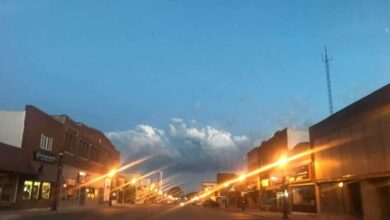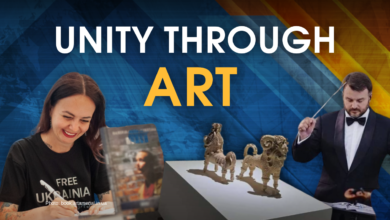you want it darker? Why are leading lights of Western culture ignoring the plight of Palestine – The Irish Times

When Palestinian parents wrench their smashed children from the rubble and wrap them in plastic for burial, what prayers, whether Muslim or Christian, do they recite over them? Do we know the words? When Israeli missiles blast a Palestinian street to smithereens and its inhabitants disperse, what memories do the dispossessed survivors carry with them? When a young Palestinian couple is married, do the bride or groom think “my children will probably have to go into exile in Dubai, Copenhagen, New York, Toronto, Dublin”? Do such fears find words? Even when they are permitted to narrate, how much Palestinian experience can ever be communicated?
For many in the Middle East and beyond, the Palestinians have long been an irritant. For Zionism, they have always been the real impediment to a majority Jewish state or to a Greater Israel. For the US and EU, they have historically been a destabilising factor in the Middle East, kindling for wider conflict. For Christian evangelicals, they are the fly in the holy ointment of the promised land, the restoration of the Jewish Temple and the Second Coming. For most Arab states, they are an obstacle to “normalisation” with Israel, a dangerous tinder because their plight might fire their own oppressed masses. Things would be easier for many if the Palestinians would fade into historical night. Generation after generation, they have declined to go gently into that good night.
For their supporters, the Palestinians signify a resilience that absorbs every conquest, every dispossession, every denigration, every seismic shock. They are the region’s Charlie Chaplins, the bedraggled ones overrun by the express trains of greater forces but who somehow dust themselves off, stand up and begin again. Sometimes, they seem the Vladimirs and Estragons of our times, waiting for what? For humanity to meaningfully act? For the Godots of the one- or two-state solutions?
But symbols of resistance don’t have children to educate, don’t get cancer, don’t take shrapnel, don’t need to survive amputations, don’t starve. The Palestinians cannot forever be expected to symbolise human resilience. As both the Israelis and the Palestinians know in their bones, peoples can be made to disappear, sometimes slowly, sometimes quickly. Sometimes one village at a time, sometimes in sudden mass destruction.
I’ll remain –
a blood stain
the size of a cloud
on the shirt of this world
Thus wrote Taha Muhammad Ali (1931-2011) who grew up in Saffuriya in Galilee. When he was 17, Taha was displaced to Lebanon when Zionists levelled his village in 1948. A year later, he returned to Nazareth, near to now depopulated Suffuriya – by legend the birthplace of Mary, mother of Jesus – that was replaced by the Israeli settlement, Tzippori. Taha Muhammad Ali scrabbled a living selling tourist trinkets in Nazareth. Not educated beyond the fourth grade as a child, he spent an adult lifetime educating himself, and published his first poem aged 40. His So What: New & Selected Poems was translated into Hebrew by exiled Palestinian-Israeli writer Anton Shammas and into English by Peter Cole, a Jewish American poet.
In the hospital,
Air bombarded moments ago,
A nurse is helping another nurse;
A dusty tomcat is mewing with terror;
A corpse is protecting another corpse.
There is a flower vase turned over,
Quite undamaged,
Like the bomber returning to base.
The flowers are intact.
These lines are from Sami al-Qasim’s The Last Target. Al-Qasim was born in 1939 into a Druze family, grew up in Rameh, like Suffuriya also in Galilee. He was dismissed from his teaching post in Israel because of his political views and jailed several times. By 30, he had written six volumes of poetry and become famous across the Arab world. He died of cancer in Rameh in 2014.
Suheir Hammad was born to Palestinian refugee parents in Amman, Jordan, in 1973. Her family emigrated to New York when she was five and she grew up in Brooklyn. These are lines taken from her Gaza Suite:
a great miracle happened here
a festival of lights
a casting of lead upon children
an army feasting on epiphany
[…]
the woman lost her parents her children and screams
my sister i have lost my sister i want to die
my sister’s eyes were honey her voice mine
i can’t face this only god only god my sister
medics killed schools hit convoys bombed
the injured are dying the dead are buried in three
hours the people pray together and curse the people
mourn loud and quiet always too loud and not enough.
Hammad didn’t write these lines in 2023 or 2024. They were composed during Operation Cast Lead in 2008-09. Her performances of Gaza Suite can be found online.
Maya Abu Al-Hayyat was born in Beirut in 1980. Her father is Palestinian, her mother Lebanese. Her You Can Be The Last Leaf: Selected Poems, was translated by Fady Joudah into English in 2022. The opening lines of Fear, the sixth poem in that volume read:
I am therefore
They point their rifles at me.
I think, therefore I am? I am, therefore they point rifles at me. I write poetry about them pointing rifles at me.
Where should we go after the last frontiers?
Where should the birds fly after the last sky?
These lines are from Mahmoud Darwish’s (1941-2008) Where Should the Birds Fly After the Last Sky? Edward Said (1935-2003) took that poem’s title for the title of his path-breaking portrait of Palestinian life, struggle, and death, After The Last Sky (1986). Swiss photographer Jean Mohr’s black and white images accompanied Said’s text. Mohr (1925-2018) was the son of German refugees from Hitler.

Does Darwish’s question permit an answer? Where indeed do Palestinians go after the last sky? Into more refugee camps? Into diaspora? Into AI-surveilled bantustans? If these are the options, no wonder they cling tenaciously to every acre, every inherited house. Still, every generation they lose ground, pushed back by new settlements, by economic hardship, by military or settler militias. Their plight brings hundreds of thousands across the world out in protest in periods of calamity, but in “normal” times they languish, and for many media they are still too “controversial”, their history too “complex” to be seriously represented.
Will the arts be the last sky into which the Palestinians finally fly? Hardly. Despite the huge interest the situation provokes, how often do we see dramas about the Israeli-Palestinian predicament in our major theatres or film festivals? Exhibitions by Palestinian artists in leading galleries? Films about the conflict on prime-time TV? For Palestinians, there appear to be as many security checks to cross to get into the arts as into other places.
Aren’t the creative classes the glassblowers of the national imagination, the weavers of humane consciousness? Can our universities and art institutes find no means to establish centres to cultivate Palestinian scholarship, letters and arts now that Gaza’s universities are demolished, those in the West Bank under constant siege? Protest against injustice is essential but works best when matched with sustained constructive action. And civil society has at least as much responsibility in this regard as the state.
Sometimes it seems that the last place where Palestinians can fly and reach even a semi-sizeable public in the West is in song:
Emel Mathlouthi’s Naci en Palestina, written in Spanish and Arabic, opens in hauntingly mournful tones:
no tengo lugar y no tengo paisaje yo menos tengo patria con mis dedos hago el fuego y con mi corazón te canto las cuerdas de mi corazón lloran
nací en palestina nací en palestina
I have no place,
And I have no country,
Nor do I have a homeland,
With my fingers I kindle fire
And I sing to you with my heart
My wounded heartstrings cry:
I was born in Palestine
I was born in Palestine

Emel’s operatic voice sweeps and swoops between Arabic lament and bitter defiance, exilic elegy and warning protest hard to distinguish.
Emel was born in Tunisia in 1982. 1960s American protest music inspired her early-career turn to political music. When the Tunisian government banned her in 2008, she moved to Paris, from where one of her songs, Kelmti Horra, became the anthem to the Tunisian revolution and Arab Spring in 2011.
Today, Emel would find little in the contemporary pantheons of American or European rock or folk music to inspire. The ageing titans of the folk and rock revolutions are mostly silent. In England, there is Lowkey (Kareem Dennis), an articulate rap activist, and in the United States, Macklemore (Benjamin Hammond Haggerty), another rapper. They appear exceptions to the music industry’s sound of silence.
The only famous names from the more respectably “artistic” tiers of American rock and folk that I can think of who have dared to touch the topic are Tom Waits (b. 1949) and Patti Smith (b. 1946).
Waits’s The Road to Peace, co-written with his Irish-American wife Kathleen Brennan, appeared on his 2006 Orphans: Brawlers, Bawlers & Bastards. It sketches the story of an 18-year-old Palestinian boy, Abdel Mahdi Shahmay, who becomes a suicide bomber:
He was a tall thin boy with a wispy moustache
Disguised as an orthodox Jew
On a crowded bus in Jerusalem
Some had survived World War Two
And the thunderous explosion blew out windows 200 yards away
With more retribution and 17 dead along the road to peace.
The bombing visits a familiar reprisal:
Now in response to this another kiss was visited upon
Yasser Taha, Israel says is a Hamas militant
And Israel sent four choppers in, flames engulfed his white Opel
And it killed his wife and three-year-old child
Leaving only blackened skeletons
Jew, World War II. Militant, Blackened Skeleton. Perfect rhyme, slant rhyme. An aesthetics of ongoing atrocity.
Patti Smith’s Qana, is about a massacre in the southern Lebanon town of Qana in 1996 when during Operation Grapes of Wrath the IDF shelled a UN compound, killing 106 and injuring 116 sheltering Lebanese civilians.
Little bodies
Little bodies
Tied head and feet
Wrapped in plastic
Laid out in the street
The new middle east
The rice woman speaks
What’s shocking about these songs and poems is that they might as well have been written last week. The little bodies tied head and feet in plastic laid out on the streets, the shelled compounds and maimed civilians are now routine headlines. Fresh deaths, fresh wounds, old news.
I am in blood
Stepped in so far, should I wade no more
Returning were as tedious as go o’er
Thus, Shakespeare’s soul-sick Macbeth. Midstream, maddened in blood, better to brazen it out and press on to the further shores of horror, too late to turn back. Murder upon murder breeds nihilism. Nihilism breeds massacre. Massacre begets war. And war begets genocide, and genocide begets …
Do we really want it darker?
Joe Cleary teaches English and Irish literatures at Yale University. His most recent books are Modernism, Empire, World Literature (2021) and The Irish Expatriate Novel in Late Capitalist Globalization (2021)
Read More



